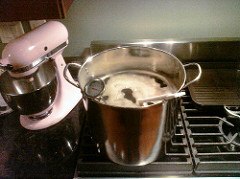 The popularity of craft beer has risen dramatically in recent years, and with it has grown the interest in home brewing. If you have ever seen someone brew beer at home, you likely know that it’s as much a science as it is an art. Even the slightest alteration to the brewing process can have dramatic effects on the outcome, which is why many home brewers are becoming interested in the impacts that their homes’ water quality is having on their brews. Today we’re going to talk about the effects that water quality has on home brewing and how installing a water treatment system can help the process!
The popularity of craft beer has risen dramatically in recent years, and with it has grown the interest in home brewing. If you have ever seen someone brew beer at home, you likely know that it’s as much a science as it is an art. Even the slightest alteration to the brewing process can have dramatic effects on the outcome, which is why many home brewers are becoming interested in the impacts that their homes’ water quality is having on their brews. Today we’re going to talk about the effects that water quality has on home brewing and how installing a water treatment system can help the process!
Water is the most essential ingredient when you’re home brewing
It should come as no surprise that water is one of beer’s main ingredients. It serves as the base for the brew, and everything else is added to it during the brewing process. The contaminants in your home’s water can affect the brewing process in a number of ways, including altering its taste and affecting the processes of extracting bitters from hops and converting grains to starch.
When you start to get serious about home brewing, it’s important to know about your tap water’s profile. North Carolina Water Consultants will test your home’s water for free so that you can learn about your water’s hardness levels and what kinds of contaminants you’re dealing with.
How water contaminants affect home brewing
The quality of your home’s tap water can affect home brewing in many different ways. Below is a list of some of the common contaminants that affect home brewing, and you can get a more complete list here:
- Calcium. Calcium is found in high levels in homes with hard water. During the brewing process, calcium can over-precipitate organic phosphates and deprive yeast of essential nutrients.
- Magnesium. Magnesium is another mineral that is found in high levels in homes with hard water. If your water contains magnesium, it can cause your beer to taste unintentionally dry, astringent or sour.
- Sulfate. If sulfates are present in your home’s tap water, they can interact with some strands of yeast and convert to sulfur. This can give your beer an offensive rotten egg smell.
- Bacteria. One of the most important aspects of home brewing is keeping everything clean and sterile. If your home’s water contains bacteria, it can spoil an entire batch of home brew.
- Chlorine and chloramine. Chlorine and chloramine are used as disinfectants in most public water supplies. These chemicals give off strong tastes and smells, with chloramine being particularly problematic because the contaminant is not affected very much by boiling water.
- pH levels. Home brewers are careful to maintain a specific pH level of their brews throughout the entire process. Improper pH levels in tap water can affect yeast’s ability to convert sugars to alcohol.
Install a water treatment system for a consistent water profile
In order to have the most control over your home brewing, install a water treatment system in your home. We particularly recommend carbon filters, acid neutralizers and water softeners to take care of many of the problems above. By installing one or more water treatment systems, you can count on your tap water to always have the same taste and profile. If you need to make any alterations to your water’s profile while you’re brewing, such as changing the pH level or adding hardness minerals, you can simply do so by adding products that are regularly available at brewing supply stores.
If you have any questions about the effects water quality has on home brewing, or if you’d like a water system serviced or installed in your home, contact North Carolina Water Consultants, your water softener and water filtration system dealer in North and South Carolina. We provide service all over the Carolinas, including towns like Cornelius, Huntersville and Charlotte, NC.
